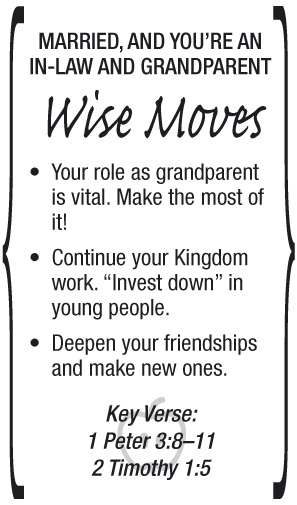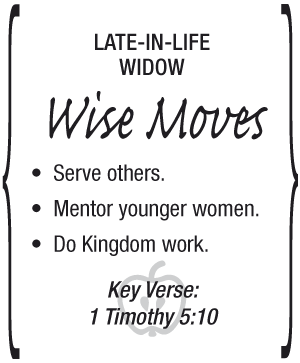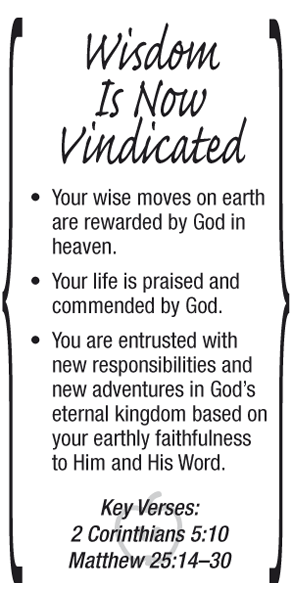The New Eve (17 page)
Authors: Robert Lewis

My kids were much more blessed. They had grandparents who both loved them and were involved in their lives. And what
a difference that made! Their presence has given my children a greater sense of connectedness, shared values, heritage, and legacy, not to mention a bigger perspective on life.
So as a grandmother, your work on your family's behalf is not finished. In new and refreshing ways you can make your life count for your grandchildren's betterment. Slip them a dose of wisdom every chance you get. Wrap it in holiday cakes, birthday cards, and warm words. Be a model of love and encouragement. Tell your grandchildren stories of your life. Lots of them. I will always treasure the memories of my mom mesmerizing my children with tales of growing up in a small Louisiana town: her rides on her pony, Buttermilk; digging up arrowheads in her backyard; her Jewish friends who opened her eyes to the larger world; and the account of Charles Lindbergh landing his plane in a bean field near her home. In everything show your grandchildren how life can finish with strength and dignity. In doing so, you will leave your mark on the next generation.

You can mentor people outside your family too. I hope by now this is already happening. Remember, you were designed for this (Titus 2:3–5; 2 Tim. 2:2). And by this phase of life, you should be well armed with both spiritual wisdom and countless life experiences that add wit and insight to your outlook for helping younger people better live their lives.
“A single person is missing for you, and the whole world is empty.”
2
These are the words Philippe Ariès used to describe the grief and displacement that follow the death of a loved one. It's an emptiness we are all destined to feel at some time or another, but among the living it is most often women who are robbed of the closest presence of all: that of a spouse. While only 7 percent of men age sixty-five and over are widowers, over a third of women in this age group are widows.
3
Novelist Joan Didion is one such woman. As Ariès would say, Didion's world emptied shortly after Christmas 2003 when her husband, author John Gregory Dunne, died of heart seizure at the dinner table. Didion came home from the emergency room and tried to carry on as before.
The problem is, she kept trying to carry on
exactly
as before, as if John were due to arrive momentarily. She left his desk untouched. Open books remained so, ready for John's probing eye. His clothes and shoes were kept in place. He was coming home. It took Didion months to see the absurdity of her actions. She had forsaken the future for the past, something that's easy to do in this season of life.
4
God cares for widows, and the Bible accordingly has a lot to say about them. Indeed, much of 1 Timothy 5 is specifically devoted to discussing the subject of older and younger widows. Younger widows, according to the apostle Paul's instruction, should seek to reenter married life (1 Tim. 5:14–15). Their mind-set needs to be more “single” than “widow.” That means dating again; focusing on a career; and preparing for marriage again, possibly even kids. Paul's message is clear: God wants younger widows to reengage in mainstream life as much as possible rather than languish as untimely victims. My friend Sandy Bone, whose
story I told in the opening of this chapter, is a prime example of how this can be done.
Older widows (those over sixty years old, according to Paul; 1 Tim. 5:9) will have a different rhythm. Life's opportunities have narrowed. It's not that remarriage is out of the question. It's not. And it's wonderful when it happens. But for many, remarriage is not realistic or necessary. There are many other good things to live for: grandchildren, friends, serving others, various kinds of Kingdom work, mentoring, and prayer, to name a few. If these things have already been a meaningful part of your life as a woman, then these cultivated habits of the heart are not hard to expand on. If not, now is the time to expand your life beyond yourself.
The real oxygen of life is in giving. Nowhere is that better seen than in the last seasons of life. Selfishness doesn't work here. Nothing is more pitiful than a demanding, self-absorbed, grasping old person. You've seen this. A stingy old person is far more disturbing than the most self-absorbed child could ever be. On the other hand, few things are more radiant and vibrant than a loving, other-centered, grace-filled senior. Jesus was right. It is “more blessed to give than to receive” (Acts 20:35). And nowhere is that truth illustrated more clearly than in the way people look and act as life is wrapping up.

For more than twenty-five years I have watched young people fill the home of Kitty Longstreth, a longtime widow. I have met few people as alive as Kitty. Now eighty-five, she has
devoted her “alone years” to encouraging, praying for, and serving others. Many people in our community would say they owe their spiritual lives to Kitty. Almost any hour of the day, a young woman is at Kitty's house, where she is pointed to God. And as much as Kitty has blessed others, this posture of giving and loving has made her own life equally rich and meaningful.
So don't waste your life looking back as an older widow. Focus instead on the good you can yet do in life. Devote yourself to others. Love. Mentor. Befriend the friendless. Show the strength of a woman who believes God's promises and works to see their fulfillment in her life.
On this earth you made only the barest beginning to your life. You knew this. Your heart told you so. Your Bible said it too. You believed your greatest adventures and your best joys were being reserved for this last season of your life.
And now you're here!
It's bigger and better than you could have ever imagined. There are surprises everywhere. But before you plunge into them, there is a powerful meeting you must have with God-one on One—to sum up the life you lived on earth. This should not come as a surprise. You were told throughout your life this moment would arrive. God spoke of it in His Word: “For we must all appear before the judgment seat of Christ, so that each one of us may be recompensed for our deeds in the body, according to what he has done whether good or bad” (2 Cor. 5:10).
Everything will be clear in this moment of infallible evaluation. Everything you did in your earthly life—as God's feminine image bearer—will be taken into account by the God who never forgets. For your acts of courageous faith and obedience, you will receive a reward that will awe and humble you (1 Cor. 3:10–14).
For faithlessness and worldly compromise, your loss of reward will hurt (v. 15).
God will also give you new responsibilities and new treasures in heaven. Exactly what those are will be based on how well you followed Christ and God's Word while on earth (Matt. 19:27–30; 25:14–29). This is the clear teaching of Scripture (Matt. 6:20; Luke 12:33; 1 Tim. 6:18–19). For sure you are
in
heaven by the grace of God alone (Eph. 2:8–9). But it is equally true that your experience and standing in heaven will be shaped by the kind of life you lived while on earth.
So choose wisely before you reach this final season of life. Live a reward-winning lifestyle so that you can walk away from your coming appointment with God with His praise and commendation ringing in your ears (Matt. 25:21) as you step into a heavenly life of unimaginable rewards. No, you won't live a perfect life on earth. No one does that. You will know failure, compromise, and shame at times. But cling to faith. Repent from periodic bouts with unbelief and worldliness. And when you finish this life, finish as one who trusted God and was blessed by Him. Live this kind of life—the life of a New Eve—and you'll find that one of God's greatest delights is in giving you and others eternal rewards in heaven.

Every godly woman will find the same reality as she enters this final, glorious season of life.
Faith pays off. Not only did faith reward her with the best of an earthly life (which she now fully understands), but it has now rewarded her with a rich heavenly life too. This promise is what every New Eve should hold on to and treasure in her heart.
So there you have it. Ten seasons of a woman's life. A wise woman will adopt this big-picture perspective as a general guide. From it she arms herself with the opportunity to make smart lifestyle choices that best fit and bless her changing seasons of life. Will that be you?
Choosing to Live with Purpose
T
hese final words conclude the life of Abraham: “Abraham breathed his last and died, … an old man and satisfied with life” (Gen. 25:8).
What a way to go. This capstone statement reveals a life rewarded with a deep sense of personal fulfillment and gratification. It also suggests a life with few regrets. In short, life worked for Abraham. It came together with a wow rather than a whimper and paid rich dividends. Is there a woman or man alive today who wouldn't want a life like this? I don't think so. But the question is, What's the secret to living such a satisfied life?
Mary Crawford thought she knew. She was single, beautiful, and well versed in all the social graces. She dined with admirals, traded banter with barons, and flitted across ballroom floors under the watchful eyes of England's most eligible bachelors.
Edmund Bertram was one of those bachelors. He was widely known for his exceptional character and steady composure, but he couldn't disguise his interest in Mary. When Mary signaled for Edmund to make his case, he began plying her with questions.
When the discussion turned to the root of happiness, Mary said with stark frankness, “A large income is the best recipe for happiness I ever heard of.” Edmund came from wealth, so Mary's reply played to his strong suit, right?
Wrong.
Though born into privilege and assured of a comfortable stipend for life, Edmund had little regard for riches. Mary was dismayed by this, but even so, she believed her future was with Edmund. Thus, she began a campaign to teach him better sense. Her future happiness depended on his discovering the importance of money.
Who is Mary Crawford? She is one of the central characters in Jane Austen's celebrated novel
Mansfield Park.
By the end of the tale, Mary's misplaced values are exposed in a drama that only Austen could compose. As a result, Mary loses noble Edmund as well as her dreams.
What happened? Her love of money and status—the very lenses through which she meant to bring happiness into focus— distorted her perception of reality. Convinced that money was the key to the good life, Mary participated in ploys and scandals that in the end undermined her credibility.
Mary's outlook is relevant because it is shared by millions of Americans today. Money buys happiness, right? Actually, it often buys the opposite, especially when it becomes the goal of life. Even scientists say so. Dr. Edward Diener has studied money and its relation to happiness in great detail. He summarized his scientific findings in one short sentence: “Materialism is toxic for happiness.”
1
If love of money is toxic for happiness, what's the tonic? The answer:
purpose.
And it's a medically proven fact. Dr. William
Sheldon of Columbia University Medical School reported as much: “Continued observations in clinical practice lead almost inevitably to the conclusion that deeper and more fundamental than sexuality, deeper than the craving for social power, deeper even than the desire for possessions, there is a still more generalized and universal craving in the human makeup. It is the craving for knowledge of
right direction
—for orientation.”
2
